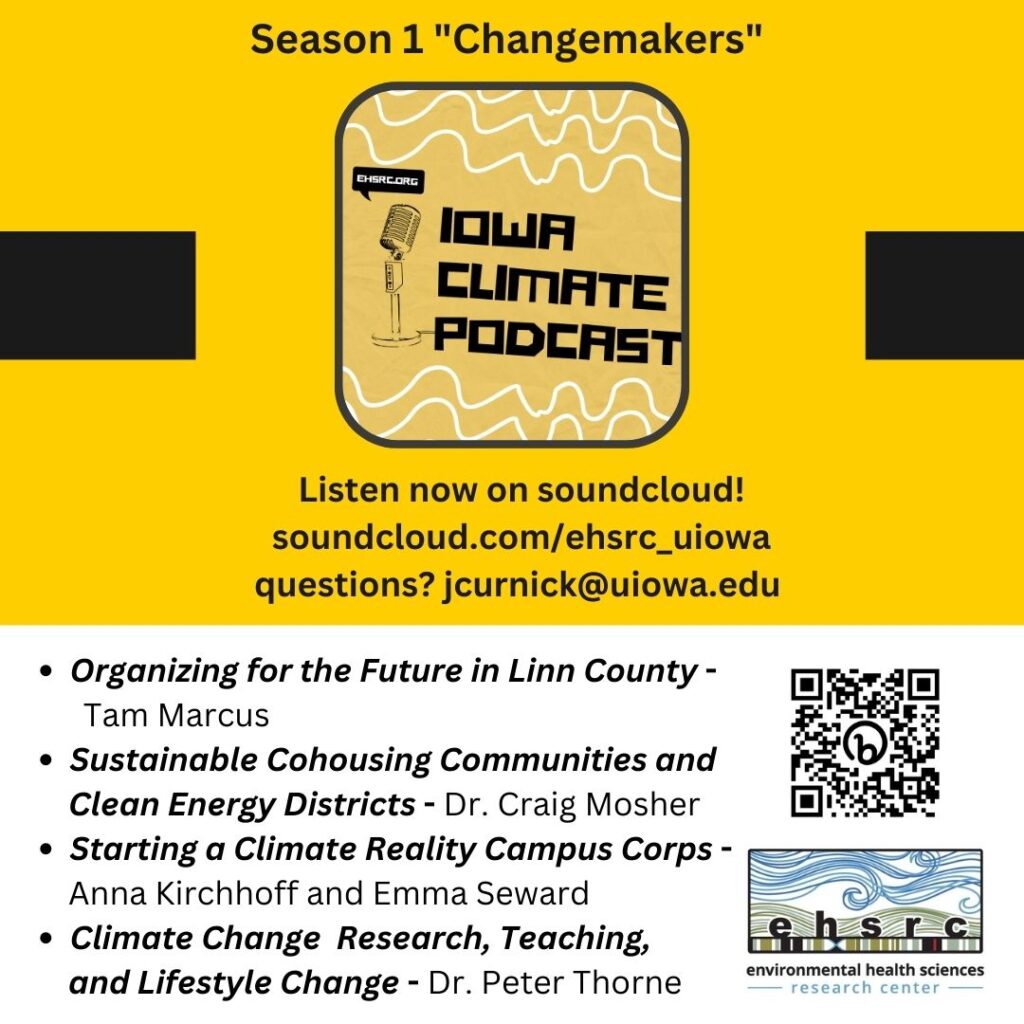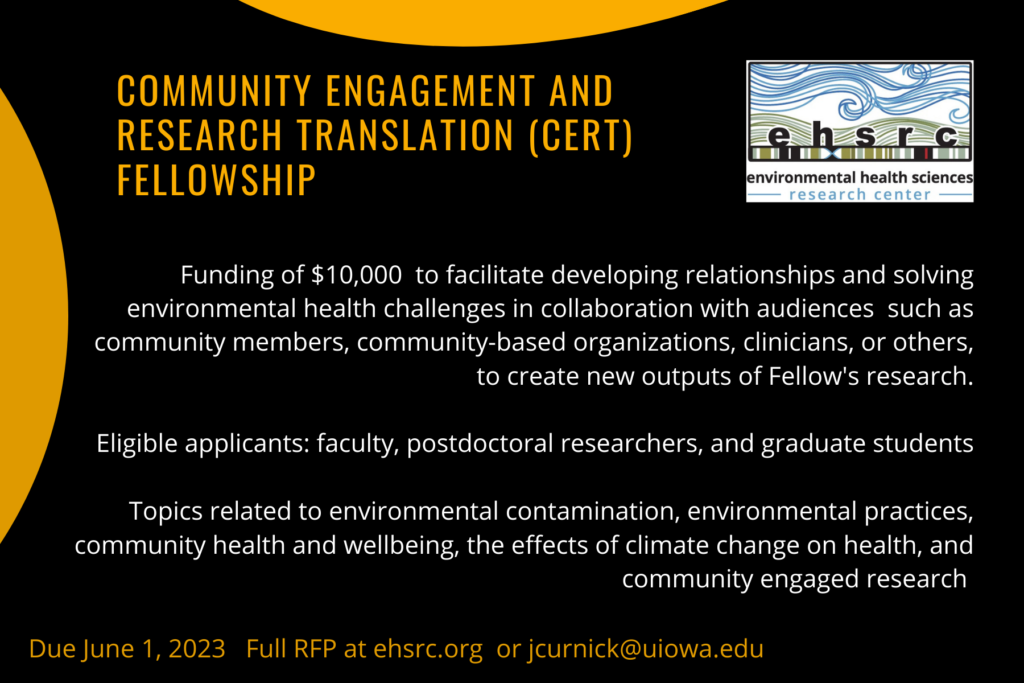The Pilot Grant program is accepting submissions with the deadlines of:
February 15, 2024: Preliminary communications as outlined March 1, 2023: Final Submission
Environmental Health Sciences Research Center
University of Iowa College of Public Health
The Pilot Grant program is accepting submissions with the deadlines of:
February 15, 2024: Preliminary communications as outlined March 1, 2023: Final Submission
Iowa Climate Statement 2023: It’s Time to Tap Iowa’s Vast Solar Energy Resources
Read the Iowa Climate Statement_2023
Press release Iowa Climate Statement 2023 News release
Video of news conference Oct 10, 2023
Article and video by KCRG: https://www.kcrg.com/2023/10/16/iowa-climate-scientists-iowa-is-under-invested-solar-energy
For questions email Nancy-Wyland@uiowa.edu
Iowa Climate Statement 2022 The Many Benefits of Our Trees
Iowa Climate Statement 2021- Strengthening Iowa’s Electric Infrastructure
Iowa Climate Statement 2020- Will COVID 19 Lessons Help Us Survive Climate Change
Iowa Climate Statement 2019- Dangerous Heat Events Will Be More Frequent and Severe
Iowa Climate Statement 2018-Extreme Weather Events
Iowa Climate Statement 2018-Designing Buildings and Communities for Iowa’s Future Climate
Iowa Climate Statement 2017-It’s not just the heat, it’s the humidity!
Iowa Climate Statement 2016-The Multiple Benefits of Climate-Smart Agriculture
Iowa Climate Statement 2015-Time for Action
Iowa Climate Statement 2014-Impacts on the Health of Iowans
Iowa Climate Statement 2013-A Rising Challenge to Iowa Agriculture
Iowa Climate Statement 2012-The Drought of 2012
Iowa Climate Statement 2011-Climate Science and Public Policy in Iowa
The various EHSRC facilities provide fascinating expertise, services and opportunities for collaboration. The facility core directors have created presentations with more information so researchers can utilize these resources. View them below or on the facility page for more details.
Exposure Science Facility Overview
The EHSRC Community Engagement Core is proud to present the Iowa Climate Podcast and teaching curriculum! In this podcast we talk about the changing climate in our state and the people who are making a different through research, activism, and community building. Season 1 is called the Changemakers season! Listen now on soundcloud !

Check out the newest call for proposals on the Pilot Grant page!
Current Deadlines
Friday April 21, 2023, 11 am -12 pm central time
View the recording of the seminar here: https://uicapture.hosted.panopto.com/Panopto/Pages/Viewer.aspx?id=8051a43b-dded-48cb-9c4d-afeb0120f98c
Disaster Preparedness and Response: Opportunities for a Community Engaged Approach
Panelists
Sato Ashida, PhD, Department of Community and Behavioral Health, University of Iowa
Jennifer Horney, PhD, MPH, Department of Epidemiology, University of Delaware
Jason Taylor, Executive Director of Bur Oak Land Trust
https://uiowa.zoom.us/j/91248514871
This event is part of our Toxicology Research seminar series
The EHSRC is pleased to announce funding available of up to $10,000 available to facilitate community engaged and translational research related to environmental health.
Due date: June 1, 2023
Effective research translation and community engagement that result in new products or knowledge are iterative processes developed over time. The CERT fellowship funding will facilitate developing relationships and solving environmental health challenges in collaboration with audiences appropriate to the Fellow’s research, including community members, community-based organizations, clinicians, or others, to create new outputs of their research that are produced in collaboration with these stakeholders. Eligible applicants include faculty of any track, postdoctoral researchers, and graduate students completing a masters or doctoral thesis at the University of Iowa with interests in issues related to environmental contamination, environmental practices, community health and wellbeing, the effects of climate change on health, and community engaged research.
Fellows are strongly encouraged to utilize the resources of the EHSRC to enhance their work. This could include regular consultations with Community Engagement Core staff or use of the Integrated Health Sciences Facility Core (IHSFC) resources (e.g. Use of Clinical Research Unit Resources, Pulmonary Function Test Laboratory, Coordinator support, Advanced Pulmonary Physiomic Imaging Laboratory (APPIL))
Activities as part of the Fellowship must be relevant to the mission of the EHSRC and may include:
Funding Available
Funds of up to $10,000 will be awarded directly to an investigator for a one-year period. Up to half of the proposed budget may be devoted to combined salary and fringe of the principal investigator. We anticipate making 1-2 awards to meritorious applications.
The application should include the following components
Email application as one document to Jacqueline-curnick@uiowa.edu
PDF of this RFP: CERT RFP 2023

Since the beginning of the COVID-19 pandemic, EHSRC researchers have been doing important work to understand and treat this illness. Below are some recent activities by center members. Check out our Response to COVID-19 page to read more.
Alejandro Comellas contributed to a study on post-COVID brain fog and fatigue, revealing a negative impact on daily activities, work/employment and interpersonal relationships. Post-acute sequelae of SARS-CoV-2 (PASC) is a poorly understood condition with significant impact on quality of life. This study aimed to better understand the lived experiences of patients with PASC, focusing on the impact of cognitive complaints (“brain fog”) and fatigue on (1) daily activities, (2) work/employment, and (3) interpersonal relationships. The team conducted semi-structured qualitative interviews with 15 patients of a Midwestern academic hospital’s post-COVID-19 clinic. Participants frequently used descriptive and metaphorical language to describe symptoms that were relapsing-remitting and unpredictable. Fatigue and brain fog affected all domains and identified subthemes included symptoms’ synergistic effects, difficulty with multitasking, lack of support, poor self-perception, and fear of loss of income and employment. Personal relationships were affected with change of responsibilities, difficulty parenting, social isolation, and guilt due to the burdens placed on family. Furthermore, underlying social stigma contributed to negative emotions, which significantly affected emotional and mental health. Our findings highlight PASC’s negative impact on patients’ daily lives.
Gary Pierce participated in a study team to evaluate the activity levels of college students during the pandemic. The Activity Questionnaire for Adults and Adolescents estimated physical activity and sedentary time before, early, and later in the pandemic. Barriers and facilitators to physical activity were assessed at early and later timepoints. Open-ended questions examined additional impacts. Comparing before vs. early/later pandemic assessments, respondents reported a significant decrease in physical activity metabolic equivalent (MET)-minutes/week and a significant increase in sedentary MET-minutes/week. The top barrier was schoolwork (47.7%). The top facilitator was social support (21.5%). Responses to open-ended questions indicated that most individuals reported sitting more during the pandemic, with variation in physical activity patterns. Adverse changes in physical activity and sedentary behavior observed early in the pandemic were sustained.
Paul Romitti co-authored a publication reporting a study on the relationship between trimester of SARS-CoV-2 infection, illness severity, and risk for preterm birth. Data was analyzed for 6336 pregnant persons with SARS-CoV-2 infection in 2020 in the United States. The study found that pregnant persons with critical COVID-19 or asymptomatic infection, compared to mild COVID-19, in the second or third trimester were at increased risk of preterm birth. Pregnant persons with moderate-to-severe COVID-19 did not show increased risk of preterm birth in any trimester.
Julia Klesney-Tait was part of a study to determine whether recipients of lung transplantation (LT) for COVID-19-related lung disease have comparable outcomes to other recipients with a similar level of lung dysfunction. Lung transplantation is an acceptable and potentially life-saving treatment option for coronavirus disease 2019 (COVID-19)-induced acute respiratory distress syndrome and pulmonary fibrosis. A total of 37,333 LT candidates from all causes were compared with 334 candidates from COVID-19-related respiratory failure. COVID-19 recipients were more likely to be younger (50 vs 57 years), male (79% vs 60%), require extracorporeal membrane oxygenation (56.3% vs 4.0%), and have worse lung function (lung allocation score, 82.4 vs 47.8) at transplantation. Patients who received a transplant for COVID-19 had similar rates of mechanical ventilation, extracorporeal membrane oxygenation, postoperative complications, and functional status at discharge compared with controls. There was no difference in overall survival or risk of death from COVID-19.
Brandi Janssen contributed to a study on how the coronavirus disease 2019 pandemic affected food availability and accessibility for many older adults, especially those experiencing food insecurity. Food citizenship is a theoretical framework that encourages the use of alternate over industrial food sources and can characterize where foods are acquired and how food choices are made. The purpose of this study is to explore how Iowans aged 50 years and older made choices about what foods to acquire and where to acquire foods during the coronavirus disease 2019 pandemic using food citizenship as a theoretical framework.